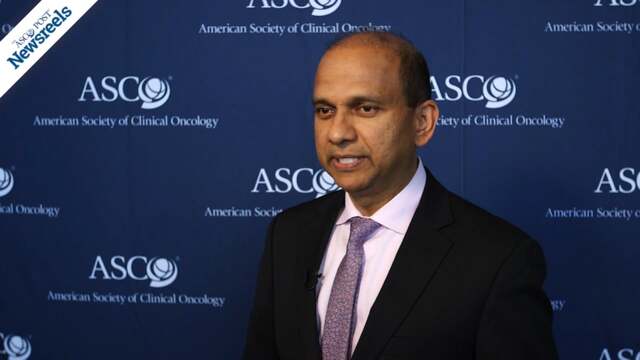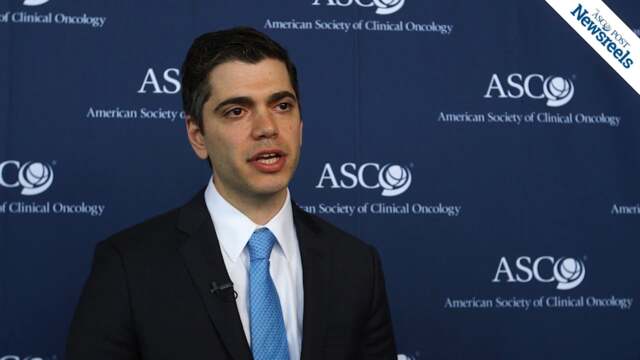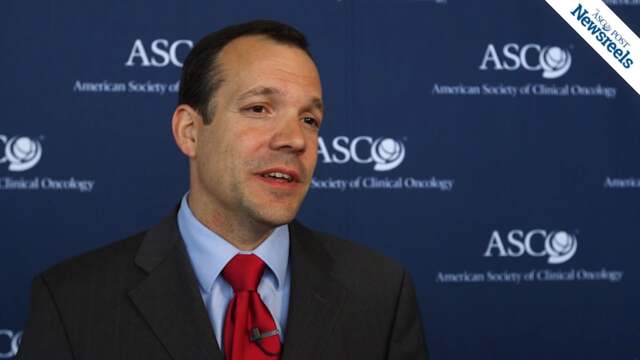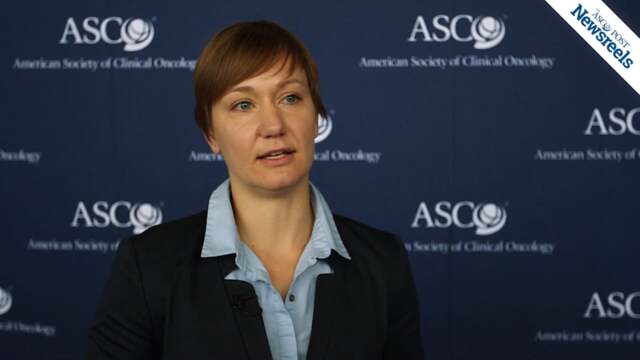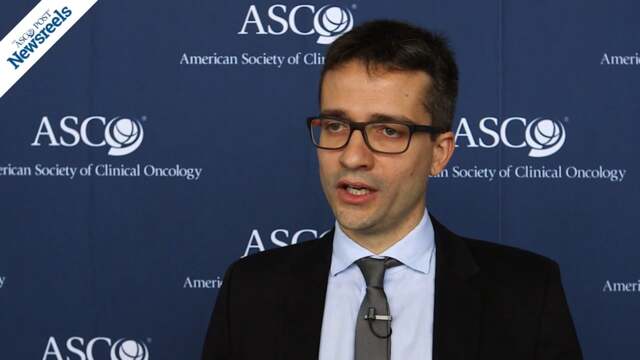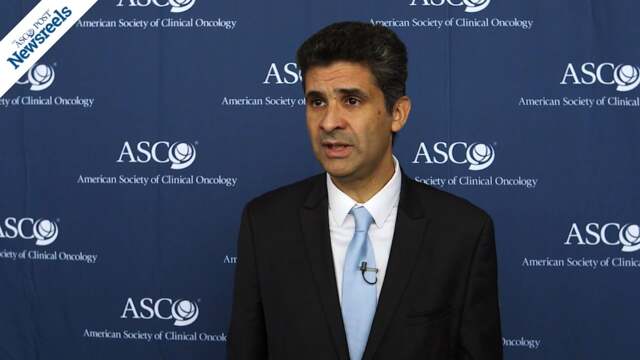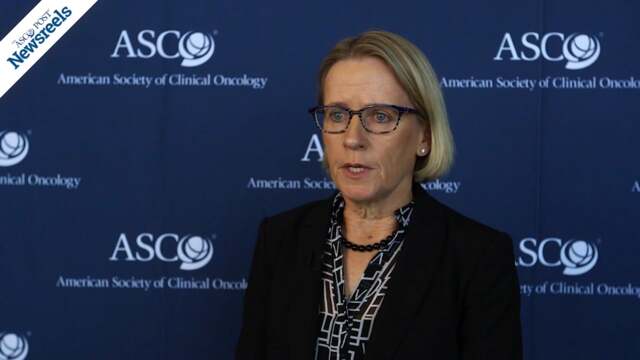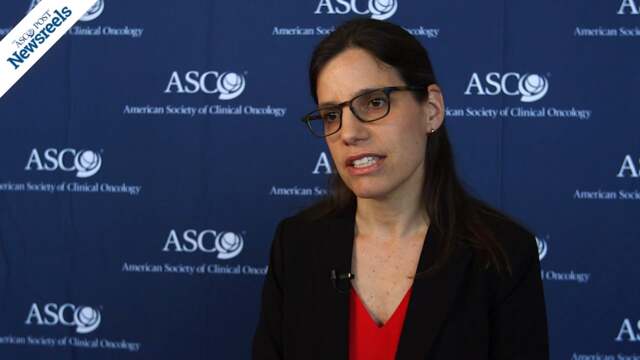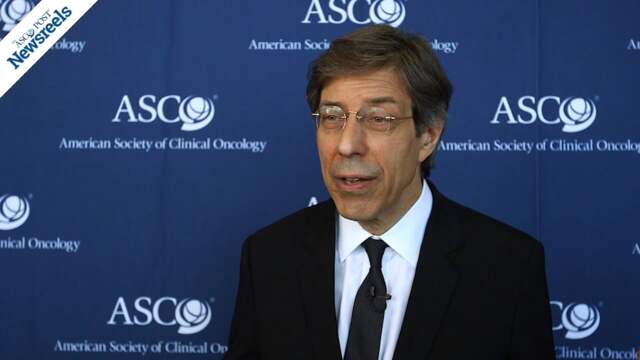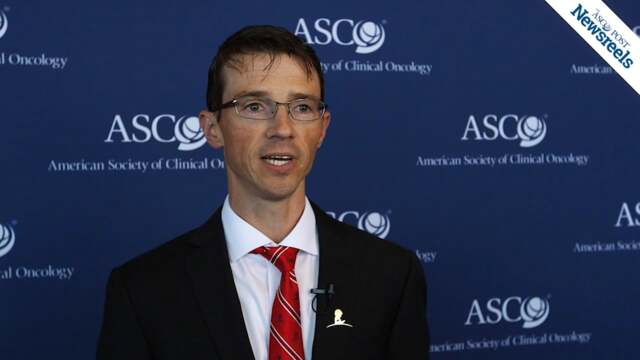2017 ASCO Annual Meeting
Ronald J. Buckanovich, MD, PhD, on Ovarian Cancer: Expert Perspective on the SOLO2 Trial
Ronald J. Buckanovich, MD, PhD, of the University of Michigan, discusses study findings on health-related quality of life with maintenance olaparib compared with placebo following chemotherapy in pati...
Jame Abraham, MD, on Breast Cancer: Expert Perspective on the MONARCH 2 Trial
Jame Abraham, MD, of the Cleveland Clinic, gives his views on findings on abemaciclib in combination with fulvestrant in patients with HR+/HER2- advanced breast cancer who progressed on endocrine ther...
Ronald J. Buckanovich, MD, PhD, on Ovarian Cancer: Expert Perspective on the ICON6 Trial
Ronald J. Buckanovich, MD, PhD, of the University of Michigan, discusses study findings on chemotherapy and cediranib in relapsed ovarian cancer. (Abstract 5506)
Taofeek K. Owonikoko, MD, PhD, on SCLC: Results of the ECOG-ACRIN 2511 Trial
Taofeek K. Owonikoko, MD, PhD, of Emory University, discusses study findings on cisplatin and etoposide in combination with veliparib or placebo for extensive stage small cell lung cancer. (Abstract 8...
Temidayo Fadelu, MD, on Colon Cancer: Results From the CALGB 89803 Trial
Temidayo Fadelu, MD, of Dana-Farber Cancer Institute, discusses study findings on nut consumption and survival in stage III colon cancer patients. Higher consumption of nuts may be associated with sig...
Maura L. Gillison, MD, PhD, on HPV and the Value of the Vaccine
Maura L. Gillison, MD, PhD, of The University of Texas MD Anderson Cancer Center, discusses her findings on the impact of prophylactic human papillomavirus vaccination on oral HPV infections among you...
Gerhardt Attard, MD, PhD, on Prostate Cancer: Results From an After-Market Study on Enzalutamide
Gerhardt Attard, MD, PhD, of The Royal Marsden Hospital and The Institute of Cancer Research, discusses trial results on continued enzalutamide post prostate-specific antigen progression in men with c...
David M. Hyman, MD, on Larotrectinib in TRK Fusion Cancers: Trial Results
David M. Hyman, MD, of Memorial Sloan Kettering Cancer Center, discusses findings on the efficacy of larotrectinib, a selective tropomyosin receptor kinase inhibitor, in adult and pediatric cancers. (...
ASCO 2017: The IDEA Collaboration: Global Study Sets New Risk-Based Standard to Personalize Chemotherapy for Colon Cancer After Surgery
After surgery for lymph node–positive colon cancer (stage III), some patients may need only half of the long-standing standard course of chemotherapy. In an analysis of 6 clinical trials with ov...
ASCO 2017: Web-Based System for Self-Reporting Symptoms Helps Patients Live Longer
A randomized clinical trial of 766 patients shows that a simple intervention—a Web-based tool that enables patients to report their symptoms in real time, triggering alerts to clinicians—c...
ASCO 2017: OlympiAD Trial: Olaparib Slows Growth of BRCA-Related Metastatic Breast Cancer
Findings from a phase III clinical trial of about 300 women may introduce poly ADP ribose polymerase (PARP) inhibitors as a new type of treatment for breast cancer. Compared to standard chemotherapy, ...
Olivier Tredan, MD, PhD, on Advanced Refractory Cancer and Molecular Screening
Olivier Tredan, MD, PhD, of the Centre Léon Bérard, discusses results from ProfilER, a study that explored the use of cancer cell genomic alterations to guide treatment in patients with advanced refra...
Erin Van Blarigan, ScD, on Colon Cancer: The Effect of Diet and Exercise, Results From CALGB 89803
Erin Van Blarigan, ScD, of the University of California, San Francisco, discusses the value of lifestyle recommendations from the American Cancer Society for people who have been diagnosed with colon ...
Matteo Lambertini, MD, on Pregnancy in Breast Cancer Patients: Results From a Multicenter Study
Matteo Lambertini, MD, of the Institut Jules Bordet, discusses a long-term follow-up analysis of the safety of pregnancy in patients with a history of estrogen receptor–positive breast cancer. (Abstra...
Nicholas D. James, MBBS, PhD, on Prostate Cancer: Results From the STAMPEDE Trial
Nicholas D. James, MBBS, PhD, of Queen Elizabeth Hospital, discusses study findings on adding abiraterone for men with high-risk prostate cancer starting long-term androgen-deprivation therapy (Abstra...
Karim Fizazi, MD, PhD, on Prostate Cancer: Results From the LATITUDE Trial
Karim Fizazi, MD, PhD, of the University Paris-Sud, discusses study findings on androgen-deprivation therapy with abiraterone acetate plus prednisone or placebos in newly diagnosed high-risk metastati...
Jane McNeil Beith, MD, PhD, on Reducing Fear in Cancer Survivors
Jane McNeil Beith, MD, PhD, of Chris O’Brien Lifehouse, discusses long-term study results on a psychological intervention, called “Conquer Fear,” designed to reduce clinical levels of fear of cancer r...
Viviane Hess, MD, on Managing Stress in Newly Diagnosed Patients
Viviane Hess, MD, of the University of Basel and University Hospital Basel, discusses a Web-based stress management tool, called STREAM, designed to reduce stress and improve quality of life for newly...
Gary Rodin, MD, on Advanced Cancer: The CALM Psychological Intervention
Gary Rodin, MD, of the University of Toronto, discusses study findings on a systematic approach to alleviating distress and managing predictable challenges. (Abstract LBA10001)
Peter Hoskin, MD, on Spinal Compression: Results From the SCORAD III Trial
Peter Hoskin, MD, of Mount Vernon Cancer Centre, discusses study findings on single-dose radiotherapy compared with multifraction radiotherapy in patients with metastatic spinal canal compression. (Ab...
Todd M. Gibson, PhD, on Childhood Cancer Survivors: Chronic Disease Trends
Todd M. Gibson, PhD, of St. Jude Children’s Research Hospital, discusses results from the Childhood Cancer Survivor Study, which showed a reduction in serious chronic morbidity measured across 3 decad...
ASCO 2017: Larotrectinib Shows Durable Efficacy Across Diverse Pediatric and Adult Cancers
Scientists may have developed the first targeted, oral, tumor-type agnostic therapy—an agent that works comparably well across many kinds of cancer, regardless of patient age. In clinical trials...
ASCO 2017: ProfiLER Trial: Routine Genomic Testing Feasible, but Only a Subset of Patients May Benefit
Genomic testing of tumor samples can enable personalized treatment selection, where targeted treatments are matched to genetic changes in the tumor. Although a growing number of patients with advanced...
ASCO 2017: New High-Intensity Genomic Sequencing Approach Detects Circulating Tumor DNA at a High Rate
In a study of 124 patients with advanced breast, lung, and prostate cancers, a new high-intensity genomic sequencing approach detected circulating tumor DNA at a high rate. In 89% of patients, at leas...
ASCO 2017: Pregnancy After Breast Cancer Does Not Increase Chance of Recurrence
Findings from a retrospective study of 1,200 women provide reassurance to breast cancer survivors who are contemplating pregnancy. In the study, women who became pregnant after an early breast cancer ...
ASCO 2017: LATITUDE Trial: Addition of Abiraterone to Standard Hormonal Therapy Improves Outcomes in Newly Diagnosed Metastatic Prostate Cancer
Adding abiraterone acetate (Zytiga) plus prednisone to standard hormonal therapy for men newly diagnosed with high-risk, metastatic prostate cancer lowers the chance of death by 38%. In a phase III cl...
ASCO 2017: STAMPEDE Trial: Adding Abiraterone to Standard Treatment Improves Survival in Advanced Prostate Cancer
The STAMPEDE clinical trial of nearly 2,000 men shows that adding abiraterone acetate (Zytiga) to a standard initial treatment regimen for high-risk, advanced prostate cancer lowers the relative risk ...
ASCO 2017: Remote Therapy Program Improves Quality of Life, Lowers Distress After Cancer Diagnosis
Most patients experience significant distress after they are diagnosed with cancer. This distress not only erodes quality of life, but can also negatively affect the course of the disease and the pati...
ASCO 2017: Single-Dose Radiotherapy as Effective as Multiple Fractions in Relieving Symptoms of Spinal Cord Compression
Spinal cord compression is a common complication in people with metastatic cancer and is a major detriment to quality of life. Radiation treatment is widely used to relieve pain and other symptoms, bu...
ASCO 2017: Low Testosterone Level After Testicular Cancer Is Common, Linked to Chronic Health Problems
In a large study, 38% of 491 testicular cancer survivors had low testosterone levels. Compared with survivors with normal testosterone levels, survivors with low testosterone levels were more likely t...
ASCO 2017: Conquer Fear Intervention Lowers Young Breast Cancer Survivors’ Fear of Cancer Recurrence
About 50% of all cancer survivors and 70% of young breast cancer survivors report a moderate to high fear of recurrence. The fear can be so distressing that it negatively affects medical follow-up beh...
ASCO 2017: Steady Decrease in Severe Health Problems for Childhood Cancer Survivors
Treatments for childhood cancer are often intense and carry the risk of lifelong health problems for survivors. An analysis of 23,600 childhood cancer survivors in the Childhood Cancer Survivor Study ...
ASCO 2017: CALM Intervention Relieves Distress in Patients With Advanced Cancer
Advanced cancer triggers enormous distress and brings challenges that can seem overwhelming. Yet most cancer centers lack systematic approaches to help patients and families manage the practical and e...
Expert Point of View: Denise A. Galloway, PhD
Denise A. Galloway, PhD, Associate Director, Human Biology Division, Fred Hutchinson Cancer Research Center, Seattle, whose research focus is human papillomavirus (HPV), told The ASCO Post that these...
Rates of Oral HPV Infection Plummet After Vaccination
Vaccination against the human papillomavirus (HPV) reduced the risk of acquiring oral HPV infections by 88%, in one of the first large studies to explore vaccination’s impact in the oropharynx. The st...
Expert Point of View: Lipika Goyal, MD
Commenting on the BILCAP study, Lipika Goyal, MD, an oncologist at Massachusetts General Hospital, Boston, said: “These results are very intriguing. There is no current standard of care for adjuvant ...
Adjuvant Capecitabine for Biliary Tract Cancer Yields Significant Improvement in Overall Survival
There is no standard adjuvant therapy for patients with resectable biliary tract cancer, but that may be about to change based on results of the phase III BILCAP trial.1 Adjuvant capecitabine signific...
ASCO 2017: Chance of Colon Cancer Recurrence Nearly Cut in Half in Patients Who Consume Nuts
An observational study of 826 patients with stage III colon cancer showed that those who consumed 2 ounces or more of nuts per week had a 42% lower chance of cancer recurrence and 57% lower chance of ...
ASCO 2017: HPV Vaccination May Reduce Oral HPV Infections but Is Still Underutilized
In one of the first large studies to explore the possible impact of human papillomavirus (HPV) vaccination on oral HPV infections, researchers found it may confer a high degree of protection. The stud...
ASCO 2017: Gefitinib Treatment Can Delay Recurrence of Intermediate-Stage Lung Cancer
The targeted therapy gefitinib (Iressa) appears more effective in preventing recurrence after lung cancer surgery than the standard of care, chemotherapy. In a phase III clinical trial, patients with ...
ASCO 2017: Healthy Lifestyle After Colon Cancer Diagnosis Helps Extend Survival
A study of 992 patients with stage III colon cancer found that those who reported a healthy lifestyle during and following adjuvant treatment had a 42% lower chance of death and a trend for lower chan...
ASCO 2017: Increase in Early-Stage Cancer Diagnoses After Implementation of the Affordable Care Act
An analysis of nearly 273,000 patients showed that between 2013 and 2014 there was a 1% increase in the percentage of breast, lung, and colorectal cancers diagnosed at the earliest, most treatable sta...
ASCO 2017: Adjuvant Capecitabine May Extend Survival in Biliary Tract Cancer
A phase III randomized clinical trial in 447 patients with biliary tract cancers showed that treating the disease with capecitabine after surgery extends survival by a median of 15 months compared to ...

